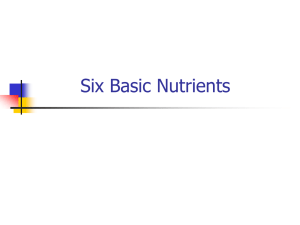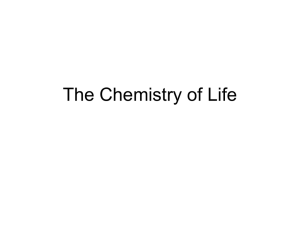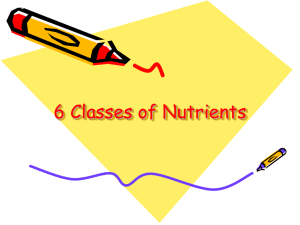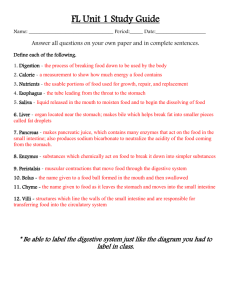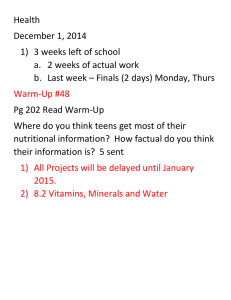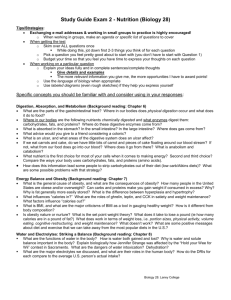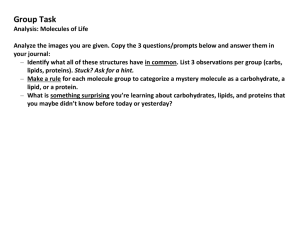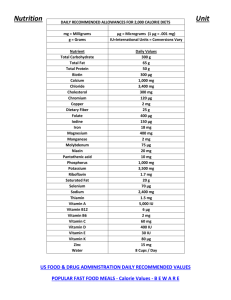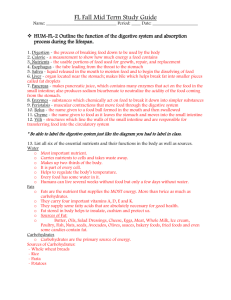Quiz
advertisement
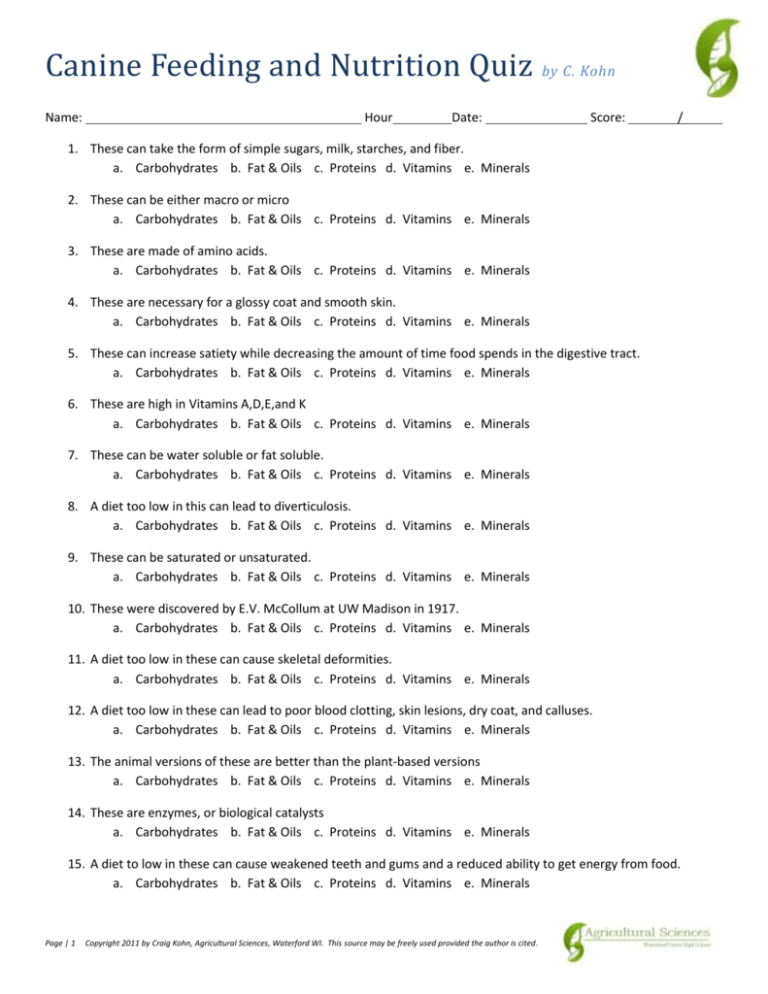
Canine Feeding and Nutrition Quiz by C. Kohn Name: Hour Date: Score: / 1. These can take the form of simple sugars, milk, starches, and fiber. a. Carbohydrates b. Fat & Oils c. Proteins d. Vitamins e. Minerals 2. These can be either macro or micro a. Carbohydrates b. Fat & Oils c. Proteins d. Vitamins e. Minerals 3. These are made of amino acids. a. Carbohydrates b. Fat & Oils c. Proteins d. Vitamins e. Minerals 4. These are necessary for a glossy coat and smooth skin. a. Carbohydrates b. Fat & Oils c. Proteins d. Vitamins e. Minerals 5. These can increase satiety while decreasing the amount of time food spends in the digestive tract. a. Carbohydrates b. Fat & Oils c. Proteins d. Vitamins e. Minerals 6. These are high in Vitamins A,D,E,and K a. Carbohydrates b. Fat & Oils c. Proteins d. Vitamins e. Minerals 7. These can be water soluble or fat soluble. a. Carbohydrates b. Fat & Oils c. Proteins d. Vitamins e. Minerals 8. A diet too low in this can lead to diverticulosis. a. Carbohydrates b. Fat & Oils c. Proteins d. Vitamins e. Minerals 9. These can be saturated or unsaturated. a. Carbohydrates b. Fat & Oils c. Proteins d. Vitamins e. Minerals 10. These were discovered by E.V. McCollum at UW Madison in 1917. a. Carbohydrates b. Fat & Oils c. Proteins d. Vitamins e. Minerals 11. A diet too low in these can cause skeletal deformities. a. Carbohydrates b. Fat & Oils c. Proteins d. Vitamins e. Minerals 12. A diet too low in these can lead to poor blood clotting, skin lesions, dry coat, and calluses. a. Carbohydrates b. Fat & Oils c. Proteins d. Vitamins e. Minerals 13. The animal versions of these are better than the plant-based versions a. Carbohydrates b. Fat & Oils c. Proteins d. Vitamins e. Minerals 14. These are enzymes, or biological catalysts a. Carbohydrates b. Fat & Oils c. Proteins d. Vitamins e. Minerals 15. A diet to low in these can cause weakened teeth and gums and a reduced ability to get energy from food. a. Carbohydrates b. Fat & Oils c. Proteins d. Vitamins e. Minerals Page | 1 Copyright 2011 by Craig Kohn, Agricultural Sciences, Waterford WI. This source may be freely used provided the author is cited. 16. These assist in the formation of blood and bones, ensure the correct composition of bodily fluids, and help to carry oxygen in the blood. a. Carbohydrates b. Fat & Oils c. Proteins d. Vitamins e. Minerals 17. Why should a dog’s diet NOT include milk? a. Milk is bad for all living things. b. Milk can cause a buildup of calcium which is toxic to dogs c. Milk cannot be digested by dogs after they are weaned d. None of the above – milk should be included in a dog’s diet 18. How would a dog have gotten carbohydrates in the wild prior to domestication? a. From grasses b. From the stomachs of their prey c. From humans d. None of the above – dogs never consumed carbohydrates naturally 19. What is the difference between saturated and unsaturated fats? a. Saturated fats have hydrogen on every available carbon bond b. Unsaturated fats have hydrogen on every available carbon bond c. Saturated fats are liquid at room temperature d. Unsaturated fats are solid at room temperature. 20. What is the difference between an essential amino acid and a non-essential amino acid? a. Essential amino acids are produced by a dog’s body. b. Non-essential amino acids are produced by a dog’s body. c. Essential amino acids are not needed for a dog’s body to function d. Non-essential amino acids are not needed for a dog’s body to function 21. Why are animal-based proteins better for a dog than plant-based proteins? a. Animal-based proteins are higher in fat b. Plant-based proteins are higher in fat c. Animal based proteins have a wider variety of amino acids d. Plant-based proteins are toxic to a dog 22. Which vitamin is water-soluble? a. A b. E c. B d. K 23. Large, smell stools and dental tartar build-up are characteristic of over-feeding what nutrient? a. Carbohydrates b. Fat & Oils c. Proteins d. Vitamins e. Minerals 24. Obesity is most closely linked to over-feeding which nutrient? a. Carbohydrates b. Fat & Oils c. Proteins d. Vitamins e. Minerals 25. Clean, fresh supplies of what nutrient must be available at all times to your dog? a. Carbohydrates b. Fat & Oils c. Proteins d. Vitamins e. Water Page | 2 Copyright 2011 by Craig Kohn, Agricultural Sciences, Waterford WI. This source may be freely used provided the author is cited.
